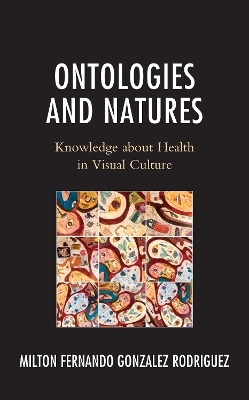
Ontologies and Natures
Knowledge about Health in Visual Culture
Seiten
2022
Lexington Books/Fortress Academic (Verlag)
978-1-6669-0949-4 (ISBN)
Lexington Books/Fortress Academic (Verlag)
978-1-6669-0949-4 (ISBN)
The book explores how images register the relation between societies and theirs and others' health epistemic ecosystems. The author focuses on presumably trivial objects, such as vlogs, a toy, or a facial cream, to show how nature is presumed and represented as part of the care and cure of the body.
In Ontologies and Natures: Knowledge about Health in Visual Culture, Fernando Gonzalez Rodriguez argues that visual culture offers insights into how societies perceive the role of nature in their own and others' pursuits to cure and care for the human body. By using a set of visual surfaces and artefacts as entry points—such as vlogs, toys, cosmetics, psychotropics, stamps, posters, and animation, among others—the book sheds light on the evolution, circulation, and rootedness of ideas about nature as a healing source. The first part of the book considers how visual culture operates as a vehicle to diffuse, transmit, mediate, and communicate health-related knowledge and imaginaries about the role of nature in medicinal therapies (e.g., a dictionary). The second part explores the process by which nature becomes a consumable, encapsulated in objects defined by their visual and material traits. The author focuses on items such as labels on packages of herbal cosmetics and infographics about superfoods. In the third part, Gonzalez Rodriguez examines the situatedness of health within two physical contexts: geographical and mental. Methodologically, the book is informed by historical sources, visual-virtual ethnography, content analysis, and semiotic-linguistic analysis of objects from all corners of the globe, paying particular attention to Indigenous traditional knowledge(s).
In Ontologies and Natures: Knowledge about Health in Visual Culture, Fernando Gonzalez Rodriguez argues that visual culture offers insights into how societies perceive the role of nature in their own and others' pursuits to cure and care for the human body. By using a set of visual surfaces and artefacts as entry points—such as vlogs, toys, cosmetics, psychotropics, stamps, posters, and animation, among others—the book sheds light on the evolution, circulation, and rootedness of ideas about nature as a healing source. The first part of the book considers how visual culture operates as a vehicle to diffuse, transmit, mediate, and communicate health-related knowledge and imaginaries about the role of nature in medicinal therapies (e.g., a dictionary). The second part explores the process by which nature becomes a consumable, encapsulated in objects defined by their visual and material traits. The author focuses on items such as labels on packages of herbal cosmetics and infographics about superfoods. In the third part, Gonzalez Rodriguez examines the situatedness of health within two physical contexts: geographical and mental. Methodologically, the book is informed by historical sources, visual-virtual ethnography, content analysis, and semiotic-linguistic analysis of objects from all corners of the globe, paying particular attention to Indigenous traditional knowledge(s).
Fernando Gonzalez Rodriguez is visiting scholar in the Department of History and Philosophy of Science at University of Cambridge and Leibniz Institute for Educational Media | Georg Eckert Institute (Leibniz Association). He is also a a Marie Curie Fellow at KU Leuven.
Part I: Images of Nature
Chapter 1. Visual Healing
Chapter 2. Animated Epistemologies
Part II: Shapes of Nature
Chapter 3. Barcoded Pharmacopeias
Chapter 4. Gendered Epistemic Artefacts
Part III: Sites of Nature
Chapter 5. Topological Panaceas
Chapter 6. Sensorial Interfaces
| Erscheinungsdatum | 01.09.2022 |
|---|---|
| Sprache | englisch |
| Maße | 157 x 238 mm |
| Gewicht | 476 g |
| Themenwelt | Geisteswissenschaften ► Philosophie ► Metaphysik / Ontologie |
| Medizin / Pharmazie ► Medizinische Fachgebiete ► Arbeits- / Sozial- / Umweltmedizin | |
| Studium ► Querschnittsbereiche ► Klinische Umweltmedizin | |
| Sozialwissenschaften ► Ethnologie | |
| Sozialwissenschaften ► Soziologie | |
| ISBN-10 | 1-6669-0949-1 / 1666909491 |
| ISBN-13 | 978-1-6669-0949-4 / 9781666909494 |
| Zustand | Neuware |
| Haben Sie eine Frage zum Produkt? |
Mehr entdecken
aus dem Bereich
aus dem Bereich
Buch | Softcover (2023)
American Psychological Association (Verlag)
125,95 €
An Interdisciplinary Textbook
Buch | Softcover (2024)
Oxford University Press (Verlag)
49,85 €


